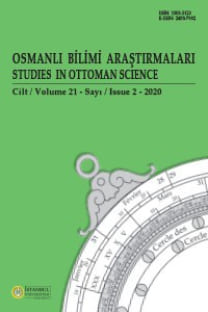Hekim Kimliği İle Abdülhak Adnan Adıvar ve Tıp Tarihi ve Deontoloji Müderrisliği
Adnan Adıvar who witnessed the downfall of the Ottoman Empire and the rise of the Turkish Republic, lived in the intersection of politics, medicine, history of culture and science, to which he contributed substantially. Dr. Adnan Adıvar was one of the young and eminent professors of the Medical Faculty of Istanbul University (Darülfünun-ı Osmani Tıp Fakültesi), although this overshadowed by his later political activities in the first Turkish National Assembly. In his senior years he came to be known as an able scholar of the history of science through his popular writings on culture and philosophy. dnan Adıvar’s medical career was mostly tied with official functions. He worked actively as a physician between 1909 and 1926 in conjunction with his political commitments. Dr. Adıvar was an associate professor (and later professor) in internal medicine and pathology for eleven years until 1920. He was, also the Administrative Director of the Medical Faculty in the years 1910- 12. He was also the General Secretary of the Turkish Red Crescent Society for 15 years, and as the General Director of Health for the Ottoman Empire between 1917 and 1919. A.Adıvar served as the first Minister of Health in the Nationalist Government in Ankara in 1920-1921. Throughout his career, he diligently undertook many responsibilities at once, despite his failing health, In this study, we review Adnan Adıvar’s life and achievements as a physician, and open to discussion two new documents regarding a novel aspect of his career. The draft copies from the sessions of the Board of Professors of Istanbul University dated 26 June 1923 and December 1923 include Dr. Adıvar’s name in the staff as a professor, a title that was conferred upon him in 1922. The appointment of his department was decided subsequently as the History of Medicine and Deontology, where there had been vacancy. The endorsement of these decisions by the University could not be located in the archives. We believe that it will be possible to document that Professor Adnan Adıvar, actually lectured on the subject in the Istanbul Medical Faculty during 1924, and a new phase of his work both in medicine and history of science can be understood.
Anahtar Kelimeler:
Abdülhak Adnan Adıvar, Tıp tarihi ve deontoloji eğitimi, Hilâl-i Ahmer Cemiyeti, Türkiye
Abdülhak Adnan Adıvar, as physician and Professor of History of Medicine and Deontology
Adnan Adıvar who witnessed the downfall of the Ottoman Empire and the rise of the Turkish Republic, lived in the intersection of politics, medicine, history of culture and science, to which he contributed substantially. Dr. Adnan Adıvar was one of the young and eminent professors of the Medical Faculty of Istanbul University (Darülfünun-ı Osmani Tıp Fakültesi), although this overshadowed by his later political activities in the first Turkish National Assembly. In his senior years he came to be known as an able scholar of the history of science through his popular writings on culture and philosophy. dnan Adıvar’s medical career was mostly tied with official functions. He worked actively as a physician between 1909 and 1926 in conjunction with his political commitments. Dr. Adıvar was an associate professor (and later professor) in internal medicine and pathology for eleven years until 1920. He was, also the Administrative Director of the Medical Faculty in the years 1910- 12. He was also the General Secretary of the Turkish Red Crescent Society for 15 years, and as the General Director of Health for the Ottoman Empire between 1917 and 1919. A.Adıvar served as the first Minister of Health in the Nationalist Government in Ankara in 1920-1921. Throughout his career, he diligently undertook many responsibilities at once, despite his failing health, In this study, we review Adnan Adıvar’s life and achievements as a physician, and open to discussion two new documents regarding a novel aspect of his career. The draft copies from the sessions of the Board of Professors of Istanbul University dated 26 June 1923 and December 1923 include Dr. Adıvar’s name in the staff as a professor, a title that was conferred upon him in 1922. The appointment of his department was decided subsequently as the History of Medicine and Deontology, where there had been vacancy. The endorsement of these decisions by the University could not be located in the archives. We believe that it will be possible to document that Professor Adnan Adıvar, actually lectured on the subject in the Istanbul Medical Faculty during 1924, and a new phase of his work both in medicine and history of science can be understood.
Keywords:
Abdülhak Adnan Adıvar, History of medicine and deontology, the Red Crescent Society, Turkey,
___
- -
- ISSN: 1303-3123
- Yayın Aralığı: Yılda 2 Sayı
- Başlangıç: 1995
- Yayıncı: İstanbul Üniversitesi Edebiyat Fakültesi
Sayıdaki Diğer Makaleler
Hekim Kimliği İle Abdülhak Adnan Adıvar ve Tıp Tarihi ve Deontoloji Müderrisliği
Emre Dölen Armağanı’nı Takdim Toplantısı (İstanbul Üniversitesi, 14 Ekim 2005) Konuşmaları
Uluslararası Bilim ve Teknoloji Tarihi Sempozyumu İstanbul, (10 -14 Mayıs 2006)
İnas Darülfünunu hakkında notlar
Adnan Adıvar'ın Bilgi Cumhuriyeti Haberleri Adlı Eseri Üzerine İzlenimler
Adnan Adıvar'ın kaleminden: “Bir Adam Gördüm”
Ondokuzuncu Yüzyıl Ortalarında Anadolu'da Bir Bitki Toplayıcısı: Theodor Kotschy (1813-1866)
